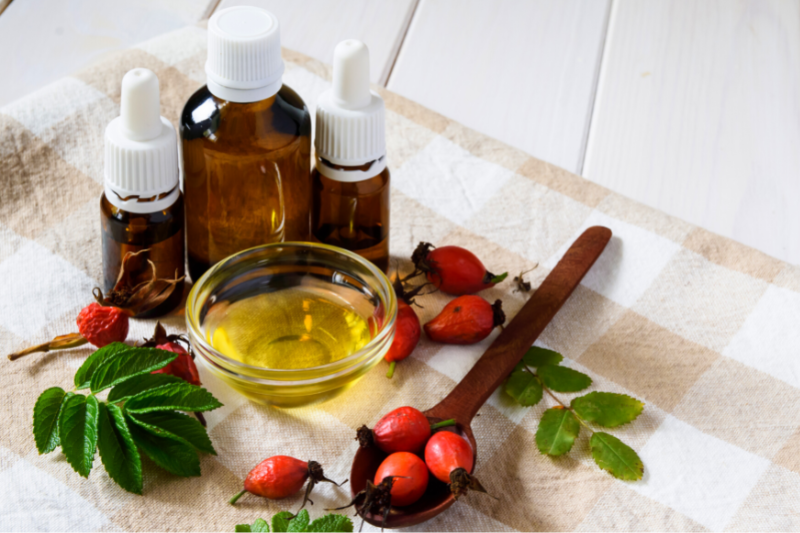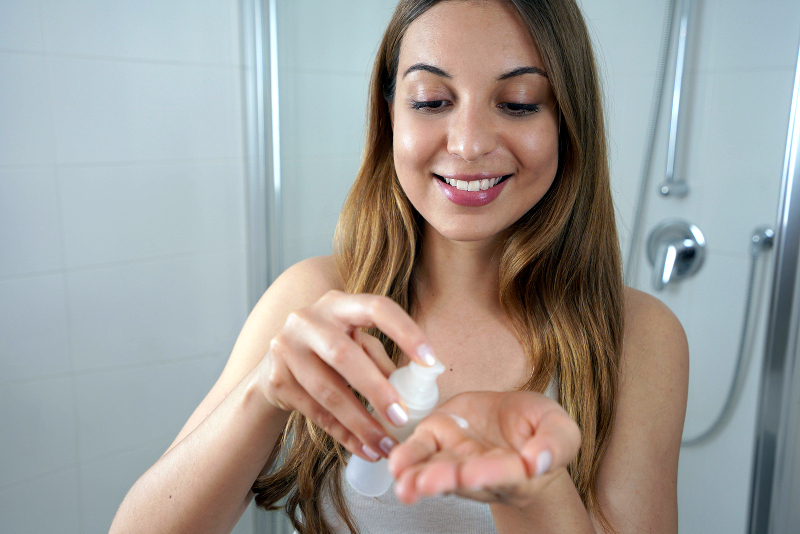Are you interested in learning about retinol and rosehip? Then you have come to the right place.
Retinol and rosehip oil are popular skincare products in many skincare creams, lotions and serums. There is discussion around rosehip oil retinol usage together on the skin and whether this is a beneficial or detrimental combination.
Rosehip oil and retinol alone are wonderful products for the skin both boasting many skincare benefits when used as part of a regular skincare regime. If you have been considering using these products as part of your skincare routine, it is a good idea to learn more about the two products first and if you should be using them together.
Each skin type is different, and not everyone will react similarly to each product. In this guide, I will take you through all you want to know about rosehip oil with retinol. Answering questions like what both products are, their benefits and other queries like “can I use retinol and rosehip oil together?”, rosehip oil before or after retinol and more.
So, to learn more, keep reading!
What Is Retinol?

Retinol, also known as Vitamin A, is a fat-soluble vitamin primarily found in green and yellow foods.
Retinol is a skincare product that can be purchased over the counter or with a prescription. It is applied topically onto the skin to decrease the look of acne, ageing and more.
Retinol is said to provide benefits on the skin, like clearing acne, supporting ageing skin and providing skin rejuvenation. There are many types of retinoids, ranging from mild to strong, where a prescription is required.
Benefits Of Retinol?
To learn more about the benefits of retinoids, read on!
Increase Skin Cell Production
Using retinol as part of your skincare routine may increase skin cell production, aka proliferation.
Unclog Pores
Retinol has the potential to unclog your pores, meaning it can be a great treatment option for those with oily skin and acne.
Increases Collagen Production
With frequent use of retinol over 3-6 months, the product can increase collagen production in the skin.
Reduces The Appearance Of Fine Lines
Retinol has the potential to reduce the appearance of fine lines and wrinkles helping the skin to appear plumper and fresh.
Can Reduce Acne
Retinol was first used as a treatment for acne in the 1970s and it can be used to reduce acne and acne scarring.
What Is Rosehip Oil?

Rosehip oil is a popular skincare product that is produced by pressing the seeds and flesh of the rosehip fruit. The most popular species of rosehip bushes for rosehip oil production are known as rosa canina and rosa rubiginosa which are commonly sourced from Chile. However, rosehip bushes can be found in many countries around the world.
Rosehip oil is frequently confused with rose oil. Rose oil, however, is produced from rose petals rather than rosehip fruit.
Rosehip oil is a skincare product that has been used since ancient times and it is packed with essential fatty acids, vitamins and minerals which are beneficial for the skin in a number of ways.
Rosehip oil contains phenols, which are known to produce a small level of antibacterial, antiviral, anti-fungal and anti-inflammatory activity, making it a nice option for those with acne.
Rosehip oil can be used in a number of ways, making it a versatile product. It can be used alone on the skin, as a carrier oil or added to skincare products like creams, serums, lotions and more.
Benefits Of Rosehip Oil?
Here are some of the benefits of rosehip oil.
Fast absorbing and Lightweight
Rosehip oil absorbs quickly into the skin and is a lightweight oil. This means it is a great option of oil for those with oily skin and acne prone skin as it is low on the comedogenic scale and it will not clog your pores.
Anti-Ageing
Rosehip oil is a nice option for ageing skin as it contains essential fatty acids omega three and linoleic acid. Rosehip oil contains beta-carotene, antioxidants, and other vitamins and minerals. These nutrients are fantastic for the skin and can help reduce the effects of ageing.
All Skin Types
All skin types can benefit from the use of rosehip oil, even those with oily and acne-prone skin types. Rosehip oil contains phenols that provide small amounts of anti-bacterial, antiviral, anti-fungal and anti-inflammatory properties.
It also has a very low comedogenic rating, meaning it will not clog pores. It is a nice choice of oil for those with oily skin, acne prone skin and those with dry skin conditions.
It is always a good idea, however, to perform a patch test before applying it all over as although rare, rosehip oil has the potential to cause allergic reactions in certain people.
Hydrating and Soothing
The nutrients found in rosehip oil are great for your skin and they work to provide deep hydration and a soothing effect on the skin.
Does Rosehip Oil Have Retinol
Yes, rosehip oil has naturally occurring retinol, which is known as retinoic acid. It has been claimed that the kind of retinol found in rosehip oil is more beneficial than retinol by itself. This is because the retinol you purchase from the store is synthetic, whereas the retinol found in rosehip oil is naturally occurring, so your skin will recognise it immediately.
Synthetic retinol takes longer for your skin to absorb as it needs time to convert into retinoic acid.
The naturally occurring retinol found in rosehip oil is sometimes not enough for certain skin types and therefore the addition of synthetic retinol can be helpful for these individuals.

Can I Use Rosehip Oil And Retinol Together?
Many people do get away with using rosehip oil and retinol together on the skin. However, as both products encourage skin cell turnover, it is generally not the best idea to use them at the same time. Using both rosehip oil and retinol on the skin at the same time can produce skin irritation, particularly if you already have sensitive skin.
To be on the safe side, I recommend using the products on alternate days or using one in the morning and one in the evening to reduce the chances of irritation on the skin.
Keep in mind, if you do not have sensitive skin, you may be able to handle the two together. If you really want to try the two products together, try performing a patch test on an area of skin.
How About Rosehip Seed Oil And Retinol Together?
So, what about retinol and rosehip seed oil?
Rosehip seed oil is similar to rosehip oil; however, rosehip seed oil is produced using only the seeds on the rosehip fruit where as rosehip oil is produced using the seeds, flesh and skin of the rosehip fruit.
Rosehip seed oil is going to react the same as rosehip oil when used with retinol. Although rosehip oil and rosehip seed oil are different products, their nutrients are the same, with varying levels of essential fatty acids, vitamins and minerals.
To be safe, you should try using these products at different times of the day rather than applying rosehip oil after retinol or vice versa. You can perform a patch test using these two products on the skin and test if you react to them.
Rosehip Oil Vs Retinol
Both rosehip oil and retinol can be beneficial products on the skin. Rosehip is less likely to cause skin irritation when compared with retinol.
Rosehip oil is a fast-absorbing carrier oil that contains various naturally occurring nutrients that are great for the skin. Retinol, on the other hand, is a synthetic product known as a synthetic retinoid. When applied to the skin, it has to be converted into retinoic acid to benefit the skin.
It is hard to say which is best between rosehip oil and retinol as it comes down to your skin type and how your skin reacts to these two products. I recommend trying both products out on alternate days over weeks/months and deciding which is best for you this way.
If you do have sensitive skin, i also recommend performing a patch test before applying these products all over the skin.
Conclusion
Both retinol and rosehip oil can be great products on the skin, it really all depends on what you are looking to achieve with your skincare regime and what skin type you personally have to decide which product is better suited for you and if you should be using the two together.
I hope you have enjoyed this guide discussing retinol and rosehip oil use on the skin, and I hope you are left feeling more confident about your decision to use these products.
Want to learn more? Find all our rosehip oil guides here or read more about the differences between rosehip oil and rosehip seed oil here. You can find our full guide to using rosehip oil on face here and for your lips here.


Comments are closed.